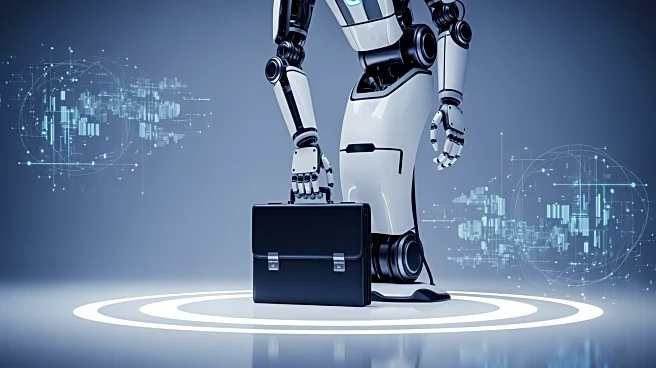What's Happening?
The U.S. is experiencing a significant increase in layoffs attributed to artificial intelligence, marking the worst job cuts since 2003. In October, companies like Amazon and Salesforce announced substantial
layoffs, citing AI as a key factor. Amazon let go of 14,000 corporate employees, while Salesforce reduced its workforce by 4,000 customer support roles, claiming AI can handle half of the company's tasks. This trend is reflected across various industries, with companies aiming to become more efficient through AI integration. According to Challenger, Gray & Christmas, October saw 153,074 job cuts, a 183% increase from September, and the highest since 2003. Experts suggest that while AI is often blamed, other factors like economic downturns and past hiring mistakes may also contribute to these layoffs.
Why It's Important?
The surge in AI-driven layoffs has significant implications for the U.S. workforce and economy. As companies increasingly rely on AI, workers face the challenge of adapting to new technologies or risk job obsolescence. This shift demands upskilling and AI literacy, which are becoming essential for career advancement. Professionals who can demonstrate AI proficiency are more attractive to employers, as AI literacy is expected to become a baseline requirement for many jobs. The layoffs highlight the need for workers to reassess their skillsets and explore adjacent fields to remain competitive. This transition could lead to a more technologically adept workforce but also poses risks of increased unemployment and economic instability if workers cannot adapt quickly.
What's Next?
For workers affected by AI-driven layoffs, the next steps involve evaluating their current skills and considering upskilling opportunities. Experts recommend focusing on adjacent skillsets that complement existing abilities, such as statistical skills for software developers. AI literacy is crucial, as it is increasingly favored by employers. Professionals should explore training programs and resources to enhance their AI knowledge and skills. Companies may continue to streamline operations with AI, potentially leading to further layoffs. Policymakers and industry leaders might need to address the broader economic impact and support workforce transition through education and training initiatives.
Beyond the Headlines
The rise of AI-driven layoffs raises ethical and societal questions about the role of technology in employment. As AI becomes more integrated into business operations, the balance between human labor and automation must be carefully managed to prevent widespread job displacement. This trend could lead to long-term shifts in employment patterns, with a greater emphasis on tech-related skills. Additionally, the use of AI as a justification for layoffs may obscure other underlying issues within companies, such as poor management or economic challenges. Addressing these complexities requires a nuanced approach to workforce development and corporate responsibility.









